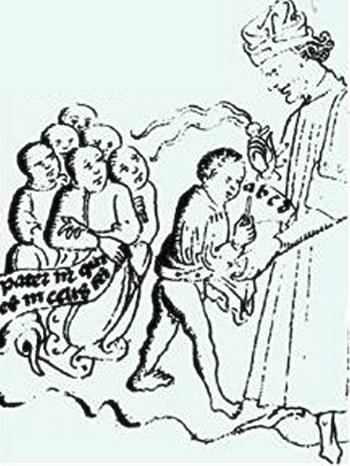Nicholas Udall

Nicholas Udall was a prominent figure in Tudor England and was best known in his day as a schoolmaster and playwright. His name is given variously as Uvedale, Udall or Woodall.
Udall was a gifted Latin scholar and confirmed Protestant, which was a dangerous position to take in Tudor England. He rose in favour in the Tudor court during the reign of Henry VIII and especially when Henry divorce his Catholic first wife Catherine and married the Protestant Anne Boleyn. Udall wrote a poem of praise for Anne on her marriage in 1533 entitled The White Falcon, which was Anne’s emblem. The first verse goes:
This White Falcon,
Rare and geason, [rare, extraordinary]
This bird shineth so bright;
Of all that are,
No bird compare
May with this Falcon White.
The following year Udall was appointed as the headmaster of Eton College. His career continued to thrive under Edward VI, also a staunch Protestant and he was asked to write an argument against the claims of West Country Catholic rebels.
As was the case for many in Tudor England, his religion became a problem when the fanatically Catholic Mary came to the throne. Udall’s response to this, unlike many Protestant martyrs, was to change sides and began working for Mary. He was described as ‘adjust his sails to the passing breeze’.
He had a reputation as a strict disciplinarian and accused of severely flogging the boys in his charge. 1541 he was convicted of improper relations with a youngster and faced capital punishment. He called in some favours from his courtier friends and was released after a year in jail.
Udall’s legacy is not his teaching or court manoeuvres but his writing.
His best known work is Ralph Roister Doister, 1552. This play is considered to be the first comedy written for the English stage. It presents a variety of characters taken from classical Greek and Roman and also chivalric literature juxtaposed with a group of hapless Tudor ne’er do wells.
He is also interesting, to this website at least, because he introduced several words and phrases into the English language. These weren’t got the most part his own coinages but lines taken from Latin texts that he translated, notably the Apophthegmes of Erasmus, 1542.
Don’t try to teach your Grandma to suck eggs
Nicholas Udall’s version “Don’t try to teach our dame to spinne.”
Don’t let the grass grow under your feet
Nicholas Udall’s version “There hath grown no grasse on my heele.”
Nicholas Udall’s version: Beeying set agog to thinke all the worlde otemele. [oatmeal]
Nicholas Udall’s version: Good felow god you saue, or o louynge frende god rest you mery.
[God save you good fellow, or,loving friend, God rest you.]Nicholas Udall’s version: Haste maketh waste.
Nicholas Udall’s version: Seeyng there is nether ryme ne reason
Nicholas Udall’s version: The Macedonians… had not the witte to calle a spade by any other name then a spade.
Nicholas Udall’s version: To haue the wurse ende of the staffe
Nicholas Udall’s version: It procedeth more of their enuie, of their unquietnes of minde… then of any faute or just deserte in Erasmus
Nicholas Udall’s version: In eche mannes bote, would he haue an ore
See also: the List of Proverbs.

